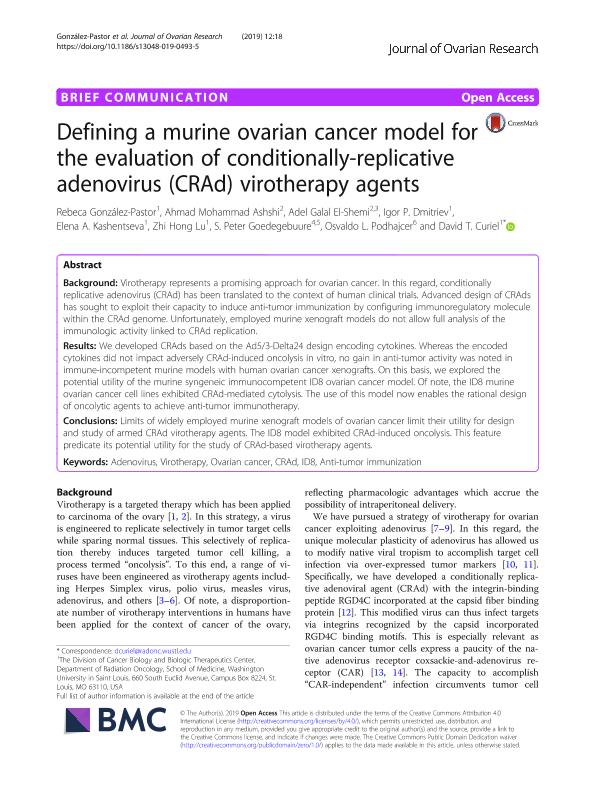Artículo
Defining a murine ovarian cancer model for the evaluation of conditionally-replicative adenovirus (CRAd) virotherapy agents
González Pastor, Rebeca; Ashshi, Ahmad Mohammad; El Shemi, Adel Galal; Dmitriev, Igor P.; Kashentseva, Elena A.; Lu, Zhi Hong; Goedegebuure, S. Peter; Podhajcer, Osvaldo Luis ; Curiel, David T.
; Curiel, David T.
 ; Curiel, David T.
; Curiel, David T.
Fecha de publicación:
02/2019
Editorial:
BioMed Central
Revista:
Journal of Ovarian Research
ISSN:
1757-2215
Idioma:
Inglés
Tipo de recurso:
Artículo publicado
Clasificación temática:
Resumen
Background: Virotherapy represents a promising approach for ovarian cancer. In this regard, conditionally replicative adenovirus (CRAd) has been translated to the context of human clinical trials. Advanced design of CRAds has sought to exploit their capacity to induce anti-tumor immunization by configuring immunoregulatory molecule within the CRAd genome. Unfortunately, employed murine xenograft models do not allow full analysis of the immunologic activity linked to CRAd replication. Results: We developed CRAds based on the Ad5/3-Delta24 design encoding cytokines. Whereas the encoded cytokines did not impact adversely CRAd-induced oncolysis in vitro, no gain in anti-tumor activity was noted in immune-incompetent murine models with human ovarian cancer xenografts. On this basis, we explored the potential utility of the murine syngeneic immunocompetent ID8 ovarian cancer model. Of note, the ID8 murine ovarian cancer cell lines exhibited CRAd-mediated cytolysis. The use of this model now enables the rational design of oncolytic agents to achieve anti-tumor immunotherapy. Conclusions: Limits of widely employed murine xenograft models of ovarian cancer limit their utility for design and study of armed CRAd virotherapy agents. The ID8 model exhibited CRAd-induced oncolysis. This feature predicate its potential utility for the study of CRAd-based virotherapy agents.
Palabras clave:
ADENOVIRUS
,
ANTI-TUMOR IMMUNIZATION
,
CRAD
,
ID8
,
OVARIAN CANCER
,
VIROTHERAPY
Archivos asociados
Licencia
Identificadores
Colecciones
Articulos(IIBBA)
Articulos de INST.DE INVEST.BIOQUIMICAS DE BS.AS(I)
Articulos de INST.DE INVEST.BIOQUIMICAS DE BS.AS(I)
Citación
González Pastor, Rebeca; Ashshi, Ahmad Mohammad; El Shemi, Adel Galal; Dmitriev, Igor P.; Kashentseva, Elena A.; et al.; Defining a murine ovarian cancer model for the evaluation of conditionally-replicative adenovirus (CRAd) virotherapy agents; BioMed Central; Journal of Ovarian Research; 12; 18; 2-2019; 1-10
Compartir
Altmétricas



